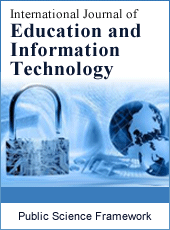International Journal of Education and Information Technology
Articles Information
International Journal of Education and Information Technology, Vol.3, No.3, Sep. 2018, Pub. Date: Aug. 6, 2018
Students Feedback for Faculty Education Development in Developing Countries: An Egyptian Sample
Pages: 31-45 Views: 2181 Downloads: 465
[01]
Sara Nada, Department of Economics, Faculty of Economy & Political Sciences, Cairo University, Cairo, Egypt.
[02]
Mohamed Hamed, Department of Electrical Engineering, Faculty of Engineering, Port Said University, Port Said, Egypt.
This paper presents an experimental sample for the student interaction with learners in the higher education. The university undergraduate study level is considered for a practical type of education where the selected sample of students has been accounted for the faculty of engineering. The electrical engineering specialty has been taken for a defined specified course at the final year of study while the same questionnaire is studied for a 10 years interval for analysis. The empirical results of statistical analysis are investigated, and the ultimate results are transformed in the percentage system to give the ability for comparison. Another course in the last time is inserted for investigation with the same questionnaire to find out the ways for the development of engineering education in Egypt. The comparison for the rate of change, the difference and the percentage change are determined. The deduced factors are treated for the education development, but all suggestions of students are discussed for the development target. All original input data of the sample are inserted in the Appendix while all evaluated data are clarified well in the analysis and discussion of the given research. The feedback of students is accounted and the comments as well as the suggestions are discussed. Valuable conclusions are derived.
Educational Development, Electrical Engineering, Evaluation and Suggestion of Students, Course Evaluation by Students, Teaching and Learning Evaluations, Empirical Questionnaire Test
[01]
C. Amunden, & M. Wilson (2012): Are we asking the right questions? A conceptual review of the educational development literature in higher education. Review of Educational Research, 82 (1): 90-126.
[02]
M. Thabet and M. Hamed (1994): The parameters affecting on the surpassing in Faculties of Engineering, Journal of Engineering Education, Kuwait, Vol. 23, (1994) 58-69. (In Arabic).
[03]
P. Felten, A. Kalish, A. Pingree & K. Plank (2007). Toward a scholarship of teaching and learning in educational development. In D. Robertson & L. Nilson (Eds.), To Improve the Academy: Resources for Faculty, Instructional and Organizational Development, 25 (pp. 93–108). San Francisco, CA: Jossey-Bass.
[04]
M. Thabet & M. Hamed (1995): The necessity for development of engineering education. Journal of Engineering Education, Kuwait, Vol. 25, 1995 (54-62). (In Arabic)
[05]
D. Little (2014): Reflections on the state of the scholarship of educational development. To Improve the Academy, 33 (1): 1-13.
[06]
M. D. Sorcinelli, A. E. Austin, P. L. Eddy & A. L. Beach (2005): Creating the future of faculty development: Learning from the past, understanding the present. San Francisco: Jossey-Bass.
[07]
Enrico Rettore, Lorenzo Rocco & Carlo Dal Maso (2018): Education is Fundamental to Development and Growth, Procedures vs. incentives: the university promotion system in Italy, The World Bank (IBRD) IDA, Journal of Education Economics, Vol. 26, 2018, Issue 3, (213-232), Online: 22 Nov 2017.
[08]
Katja Görlitz & Christina Gravert (2018): The effects of a high school curriculum reform on university enrollment and the choice of college major, International Journal of Education Economics, Volume 26, 2018 - Issue 3 (321-336), Published online: 02 Feb 2018
[09]
M. Thabet & M. Hamed (1995): The effect of fundamental sciences on the level of graduated students in Faculties of Engineering. Journal of Engineering Education, Kuwait, Vol. 24, (1995) 41-51. (In Arabic)
[10]
M. Thabet and M. Hamed (1996): Statistical study of an educational model for the development of Engineering Education. Journal of Engineering Education, Kuwait - Vol. 27 (14-25), Dec. 1996. (In Arabic)
[11]
Mohamed Hamed (2003): Design of Electric Stations, General Authority for Educational Buildings, Cairo, Egypt, 2003, 11617 / 2002 ISBN 977-6079-07-5. pp. 191. http://www.askzad.com/
[12]
https://www.researchgate.net/profile/Mohamed_Hamed8/Mohamed Hamed & Sara Nada: Analysis of Electric Loads, Lambert Academic Publishing (LAP), Germany, (Omni Scriptum GmbH & Co. KG.), July 2011, No. 26286, ISBN-13: 978-3845430225 ISBN-10: 3845430222, pp. 258, Book.
[13]
Howard R. Bowen and Cameron Fincher: Investment in Learning – The Individual and Social Value of American Education, edited by Howard Bowen, Edition 1st Edition, First Published 30 July 1996, eBook Published 16 January 2018, Pub. location New York, Imprint Routledge, Pages 507 pages, eBook ISBN 9781351309912, Subjects Education, http://www.josseybass.com
[14]
Päivikki Jääskelä, Seija Nykänen & Päivi Tynjälä Finnish: Models for the development of generic skills in Finnish higher education, Journal of Further and Higher Education, Pages 130-142 | Received 02 Oct 2015, Accepted 14 Feb 2016, Published online: 01 Aug 2016, https://doi.org/10.1080/0309877X.2016.1206858
[15]
Ingrid Molderez & Elsa Fonseca: The efficacy of real-world experiences and service learning for fostering competences for sustainable development in higher education, Journal of Cleaner Production, Volume 172, 20 January 2018, Pages 4397-4410, https://doi.org/10.1016/j.jclepro.2017.04.062

ISSN Print: 2381-7410
ISSN Online: 2381-7429
Current Issue:
Vol. 5, Issue 1, March Submit a Manuscript Join Editorial Board Join Reviewer Team
ISSN Online: 2381-7429
Current Issue:
Vol. 5, Issue 1, March Submit a Manuscript Join Editorial Board Join Reviewer Team
| About This Journal |
| All Issues |
| Open Access |
| Indexing |
| Payment Information |
| Author Guidelines |
| Review Process |
| Publication Ethics |
| Editorial Board |
| Peer Reviewers |


